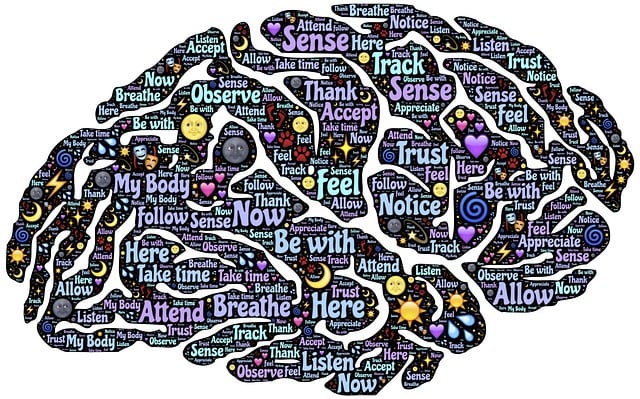Parker German Speaking Therapy (PGST) offers specialized mental wellness support for German-speaking individuals in an English-speaking environment, addressing cultural and linguistic barriers through culturally sensitive practices. Their therapeutic approach fosters trust and open communication by facilitating client expression in their native tongue, focusing on topics like family dynamics and community values. PGST integrates structured activities such as Mental Wellness Journaling Exercises to enhance resilience and promote self-awareness. Success is measured using both quantitative and qualitative assessments, ensuring tailored facilitation techniques based on feedback for optimal session outcomes. This comprehensive approach can also be seamlessly integrated into Community Outreach Programs, improving accessibility for diverse populations needing mental wellness services.
Mental wellness group facilitation plays a pivotal role in fostering collective support and enhancing individual growth. This article explores effective techniques, particularly focusing on Parker German Speaking Therapy, a specialized approach. We delve into creating safe, supportive group dynamics, exploring proven facilitation methods for optimal mental wellness outcomes. Additionally, we discuss assessment strategies to measure success and track progress within these therapeutic sessions.
- Understanding Parker German Speaking Therapy: An Overview
- Group Dynamics: Creating a Safe and Supportive Environment
- Facilitation Techniques for Effective Mental Wellness Groups
- Measuring Success: Assessment and Tracking Progress in Group Sessions
Understanding Parker German Speaking Therapy: An Overview

Parker German Speaking Therapy (PGST) is a therapeutic approach designed to address the unique needs of individuals who speak German as their primary language but seek support for their mental wellness in an English-speaking environment. This therapy model recognizes the cultural and linguistic barriers that can exist when accessing traditional mental health services, aiming to bridge these gaps effectively. PGST facilitates open communication by providing a safe space for clients to express themselves in their native language, fostering trust and encouraging active participation.
The approach integrates culturally sensitive practices tailored to German-speaking communities, ensuring relevant topics are addressed, such as family dynamics, community values, and specific challenges faced within these cultural contexts. This is particularly beneficial for individuals dealing with burnout or the development of self-care routines for better mental health, as it allows them to connect with therapists who understand their cultural background. Additionally, PGST can be seamlessly integrated into Community Outreach Programs to enhance accessibility and support diverse populations in need of mental wellness services.
Group Dynamics: Creating a Safe and Supportive Environment

Creating a safe and supportive environment is paramount when facilitating mental wellness groups. As a group facilitator, it’s crucial to establish clear boundaries, ensuring every member feels heard, respected, and valued. This involves active listening, validating emotions, and fostering an atmosphere of non-judgment. Techniques like encouraging open dialogue, using reflective statements, and promoting positive reinforcement can help build trust and encourage vulnerability.
At Parker German Speaking Therapy, we understand the power of group dynamics in mental wellness journeys. Through structured activities, icebreakers, and inclusive practices, facilitators can enhance resilience building within the group. For instance, Mental Wellness Journaling Exercises guided by a professional can offer individuals a private space to process their thoughts, emotions, and experiences while fostering self-awareness and personal growth.
Facilitation Techniques for Effective Mental Wellness Groups

Effective mental wellness group facilitation involves a blend of structured activities and flexible dynamics tailored to foster open communication and emotional support among participants. Techniques such as guided discussions, mindfulness exercises, and interactive workshops help create a safe space for sharing experiences and exploring coping strategies. Facilitators like Parker German Speaking Therapy professionals utilize these methods to promote active participation, encouraging members to build upon each other’s insights and develop practical skills for managing stress, improving emotional regulation, and cultivating positive thinking.
By incorporating diverse engagement strategies, facilitators can adapt to the group’s evolving needs, ensuring everyone feels valued and heard. This dynamic approach not only enhances the therapeutic benefits of group sessions but also strengthens the sense of community among participants, fostering a supportive environment conducive to mental wellness growth and recovery.
Measuring Success: Assessment and Tracking Progress in Group Sessions

Measuring success in group therapy sessions is a multifaceted process that goes beyond simply counting attendance or evaluating initial feedback. At Parker German Speaking Therapy, we prioritize quantitative and qualitative assessments to track individual progress and ensure each participant receives tailored support. This involves using validated psychological tools to gauge improvements in symptoms related to anxiety relief and mental health awareness. By regularly collecting data through pre- and post-session evaluations, facilitators can identify specific areas of growth or challenges within the group dynamic.
Additionally, ongoing dialogue with group members fosters an environment of openness where individuals can share their experiences, including the impact of mindfulness meditation practices. This feedback loop allows therapists to adjust facilitation techniques accordingly, catering to the evolving needs and progress of the group as a whole. Such continuous assessment enables us to optimize session outcomes, enhance participation, and ultimately facilitate meaningful transformations in mental wellness.
In conclusion, facilitating mental wellness groups using techniques like those explored regarding Parker German Speaking Therapy can profoundly enhance individual well-being. By cultivating a safe and supportive environment through effective group dynamics, facilitators empower participants to share, grow, and progress. Employing tailored facilitation methods and measuring success through assessment and tracking progress, these groups become powerful tools for personal transformation and improved mental health.














